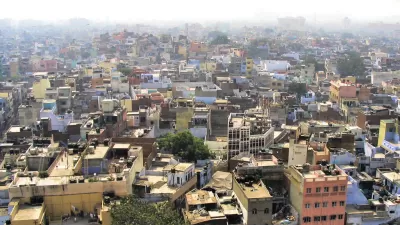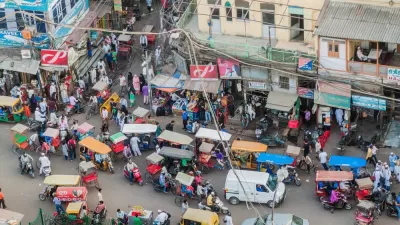Contrary to popular belief, Beijing's air pollution is not nearly the worst in the world. The air of Delhi, India, is twice as polluted. For expats, this disaster raises important questions: is it ethical to live, and raise children, in India?

In the United States, it's becoming increasingly hard to appreciate the dangers of air pollution. Though work remains to be done, American cities and industries have managed to reduce exhaust through a variety of methods, some of which are considered expensive but which environmentalists consider good investments. To see the benefits of those investments, one needs only look, tragically, to India, whose cities have some of the worst pollution in the world.
In an op-ed, New York Times correspondent Gardinier Harris makes this tragedy personal. While Indian citizens may have no choice but to suffer in dirty air, expatriates face a choice of whether to live in India or not. Harris, who lived in Delhi, argues that the dangers posed by air pollution increasingly make this not just a lifestyle choice but in fact a moral choice, with his children's lives literally at stake.
"Delhi’s true menace came from its air, water, food and flies. These perils sicken, disable and kill millions in India annually, making for one of the worst public health disasters in the world. Delhi, we discovered, is quietly suffering from a dire pediatric respiratory crisis, with a recent study showing that nearly half of the city’s 4.4 million schoolchildren have irreversible lung damage from the poisonous air."
"Foreigners have lived in Delhi for centuries, of course, but the air and the mounting research into its effects have become so frightening that some feel it is unethical for those who have a choice to willingly raise children here. Similar discussions are doubtless underway in Beijing and other Asian megacities, but it is in Delhi — among the most populous, polluted, unsanitary and bacterially unsafe cities on earth — where the new calculus seems most urgent.
"Sarath Guttikunda, one of India’s top pollution researchers, who moved to Goa, on the west coast of India, to protect his two young children, was unequivocal: 'If you have the option to live elsewhere, you should not raise children in Delhi.'....And then there are nascent areas of research suggesting that pollution can lower children’s I.Q., hurt their test scores and increase the risks of autism, epilepsy, diabetes and even adult-onset diseases like multiple sclerosis."
FULL STORY: Holding Your Breath in India

Maui's Vacation Rental Debate Turns Ugly
Verbal attacks, misinformation campaigns and fistfights plague a high-stakes debate to convert thousands of vacation rentals into long-term housing.

Planetizen Federal Action Tracker
A weekly monitor of how Trump’s orders and actions are impacting planners and planning in America.

San Francisco Suspends Traffic Calming Amidst Record Deaths
Citing “a challenging fiscal landscape,” the city will cease the program on the heels of 42 traffic deaths, including 24 pedestrians.

Defunct Pittsburgh Power Plant to Become Residential Tower
A decommissioned steam heat plant will be redeveloped into almost 100 affordable housing units.

Trump Prompts Restructuring of Transportation Research Board in “Unprecedented Overreach”
The TRB has eliminated more than half of its committees including those focused on climate, equity, and cities.

Amtrak Rolls Out New Orleans to Alabama “Mardi Gras” Train
The new service will operate morning and evening departures between Mobile and New Orleans.
Urban Design for Planners 1: Software Tools
This six-course series explores essential urban design concepts using open source software and equips planners with the tools they need to participate fully in the urban design process.
Planning for Universal Design
Learn the tools for implementing Universal Design in planning regulations.
Heyer Gruel & Associates PA
JM Goldson LLC
Custer County Colorado
City of Camden Redevelopment Agency
City of Astoria
Transportation Research & Education Center (TREC) at Portland State University
Jefferson Parish Government
Camden Redevelopment Agency
City of Claremont



























